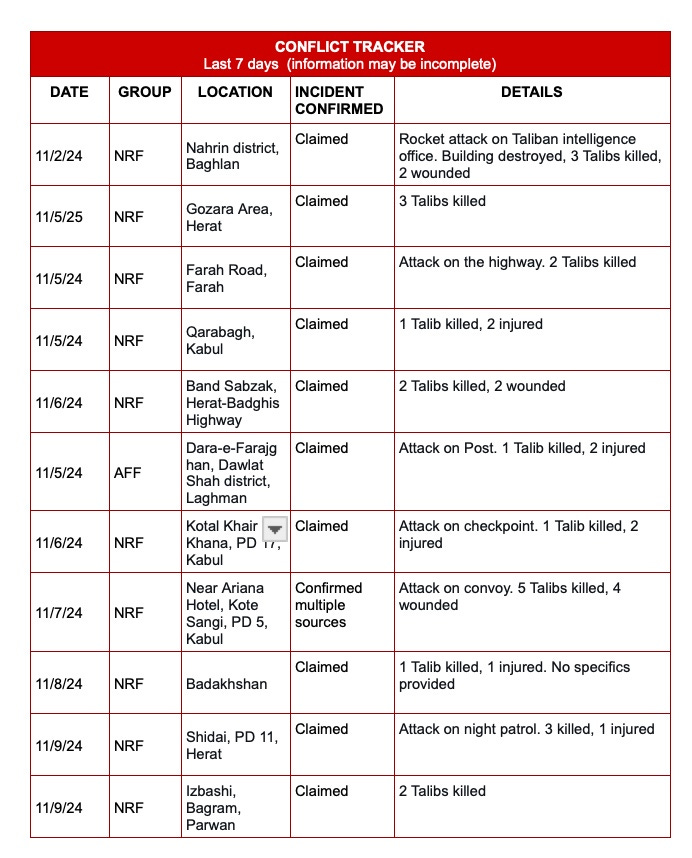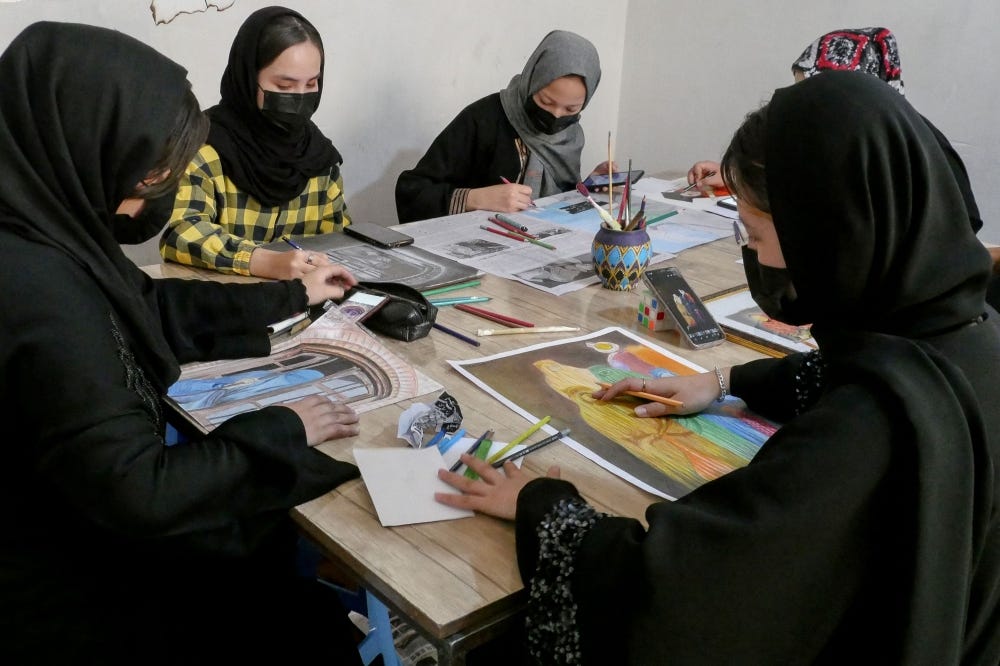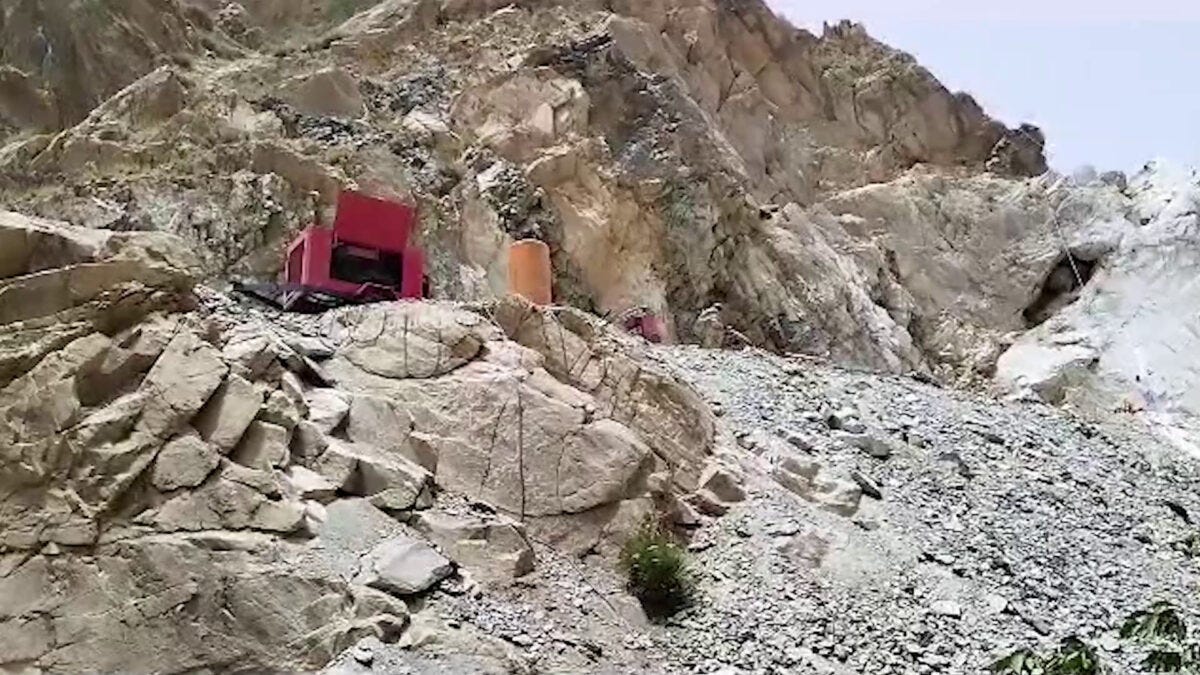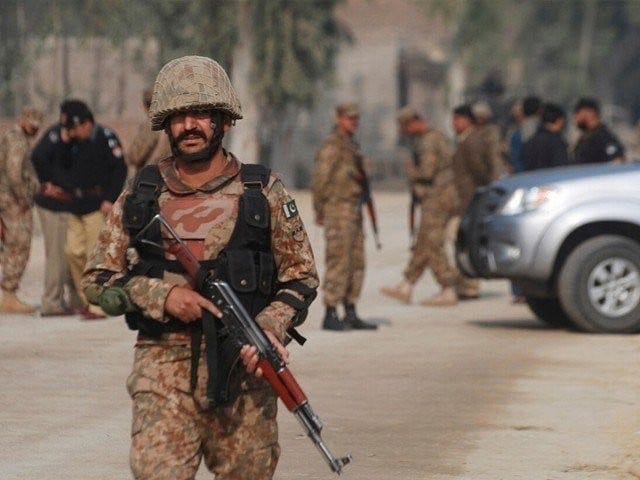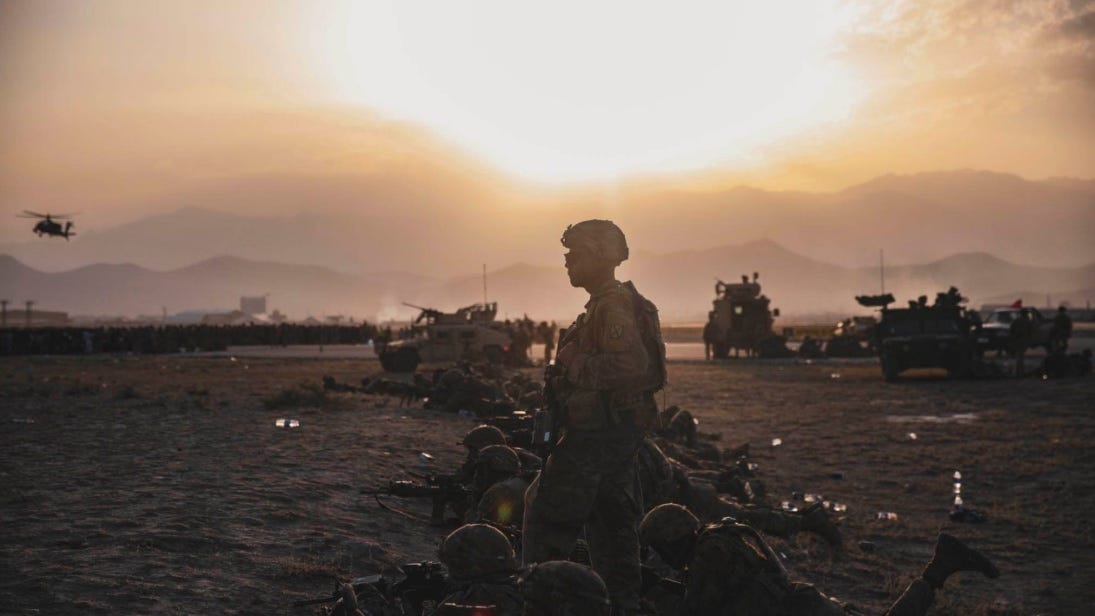The Week of October 4-November 11
We’re closely watching how U.S. election results may influence American involvement in Afghanistan and impact Afghans in the U.S. or seeking migration. Updates will follow as more details emerge.
Security and Conflict
IS Executions in Ghor – On Thursday, Taliban officials in Ghor confirmed that Taliban forces executed two alleged ISKP members late at night near Shah Teagh and Ghalmeeen, approximately 40 km from Ferozkoah. The executed individuals were reportedly from Murghab district. These extrajudicial executions, lacking transparency and due process, raise concerns about Taliban practices. Recently, some Taliban commanders and fighters in Ghor have defected to ISKP. A Taliban raid against ISKP led to multiple ISKP casualties, including a Taliban special forces commander, suggesting these actions may aim to prevent further defections.
IS Operations in Several Provinces – Beginning Thursday, Taliban forces launched targeted operations against ISKP members in Kabul, Ghor, and Kunar, according to Taliban-affiliated Al-Mersaad media. Over 48 hours, Taliban forces reportedly killed two suspected ISKP members, including a foreign national, and arrested two others in Kabul. In Ghor, two alleged ISKP members were killed, and one was arrested, while in Kunar, one ISKP member was reportedly killed.
Citizens Clash with Talibs in Ghor – On Monday, in Ghor’s Sharaaak district, villagers clashed with Taliban forces, disarming around 20 fighters led by Commander Wasiq, who reportedly lacks jurisdiction in the area. Residents accuse Wasiq of exploiting his authority to settle a family grudge under the pretext of drug searches targeting methamphetamine and ephedra, a key income source for villagers. This incident, along with recent clashes in Nimroz and Sharistan, underscores local grievances and tensions over Taliban involvement in the drug trade.
Mobile Intelligence Units Created in Badakhshan – On Sunday, November 3, Taliban officials in Badakhshan announced the formation of a mobile patrol unit in Fayzabad and several districts to address rising insecurity. Spokesman Ehsanullah Kamgar stated that over 100 Taliban fighters on motorcycles would patrol the city and districts such as Yeftal, Baharak, and Kishm to combat crime and instability. A similar unit for Badghis was announced on Sunday. This move follows periodic attacks by the National Resistance Front and Freedom Front on Taliban positions in the region.
House to House Searches in Nangarhar – On Monday, the Taliban began house-to-house searches in Jalalabad near key sites, including intelligence and police offices, causing local fear and travel disruptions. Led by Taliban intelligence, the searches have blocked roads, and residents are warned against renting homes without police and intelligence approval. Locals have also been instructed to report any suspicious individuals, intensifying tensions in the area.
Afghan Security Watch Report on October – According to Afghan Security Watch, 47 security incidents were reported in Afghanistan during October, with 26 confirmed by independent sources. Of these, 11 were attributed to the Freedom Front, 6 to the National Resistance Front, 2 to ISIS-Khorasan, 3 to the People's Sovereignty Front, and 4 to unknown perpetrators. The Freedom Front recorded nearly twice as many attacks as in September. The National Resistance Front carried out its deadliest attack of the year on October 4 in Panjshir, resulting in 15 deaths and 2 injuries. Civilian casualties were reported in 4 incidents across 15 provinces, with Kabul alone recording 14 incidents.
Human Rights and Civil Liberties
Restrictions on Female Healthcare Workers in Kandahar – In Kandahar, Taliban morality authorities have warned female healthcare workers not to work without a male relative present. Over recent days, Taliban officials visited health centers across the city to enforce this policy, requiring women to carry ID cards that include their and their male guardian’s details. Female workers have protested the restrictions, citing family constraints, while officials insist on strict adherence to the new rules, further reducing healthcare access in rural districts.
Seven Detained In Logar for Moral Crimes – The Taliban’s Ministry of Promotion of Virtue and Prevention of Vice reported the arrest of eight individuals, including a woman, in Logar’s Baraki Barak district on November 11 for alleged “illicit relationships” and “moral corruption.” The arrests occurred in Qala-e Shah Ghasi village; no additional details were provided.
Afghan Baloch Counsel Representative Arrested – The Taliban reportedly detained Ghulam Nabi Baloch, leader of the Afghan Baloch Council, on Sunday in Kabul’s Karte Parwan district without explanation, taking him to an undisclosed location. Efforts to locate him have been unsuccessful, and Taliban officials have not yet commented. Although Baloch had previously expressed support for the Taliban, his arrest follows past meetings where the Baloch Council requested representation within Taliban-led government roles.
Three ANSF Arrested – On Sunday in Laghman, Taliban intelligence arrested three former military personnel: Mohammad Iqbal, former local police commander of Dawlat Shah; Makhan, a former local police officer; and Hikmatullah, a former army member. They were detained in Dawlat Shah and Alishing districts over the past two weeks, accused of collaborating with anti-Taliban groups and possessing weapons. Relatives have denied the accusations, and Taliban officials have yet to comment.
Floggings – On Monday, the Taliban flogged two men and one woman in Nangarhar. On Tuesday, 22 people were flogged in Jawzjan, two in Paktika, and three in Wardak and Kabul. Additionally, two people were flogged in Parwan on Wednesday and two were flogged on Monday, November 11 in Ghazni.
Internal Politics
Mullah Hibatullah Calls Cabinet Meeting – Taliban leader Mullah Hibatullah summoned his cabinet to Kandahar to discuss stricter enforcement of the “Promotion of Virtue” law, banning media use during the session and warning members against opposing the law. The meeting is reportedly a response to Sirajuddin Haqqani’s recent New York Times interview, seen as dissent, and aims to align all members with official Taliban policies amid rising internal tensions over Haqqani’s public defiance and ambitions.
New Decree on Weapons – A new Taliban decree centralizes authority over military equipment distribution, granting sole control to Taliban leader Hibatullah Akhundzada. This move removes power from the Ministries of Defense, Interior, and the Intelligence Directorate. Under this directive, any Taliban department needing military supplies must submit requests to Akhundzada’s office in Kandahar. The decree requires Akhundzada’s representatives to oversee the opening and closing of military depots and manage all weapon distributions. Spokesperson Zabihullah Mujahid stated that the policy aims to prevent equipment misuse and enhance coordination. The decision reportedly follows tensions after Interior Minister Sirajuddin Haqqani distributed weapons to his supporters.
Ministry of Justice Committee on Confiscated Land – The Taliban's Ministry of Justice reported that a technical committee has seized 37,429 jeribs of state land across 12 Afghan provinces within a month, with the largest portion (10,000 jeribs) in Takhar. The confiscations followed investigations confirming the lands as state property. The ministry stated it will continue efforts to identify, investigate, and reclaim public lands throughout Afghanistan, though it did not specify the previous occupants or the timing of the seizures.
Taliban Reshuffling – The Taliban announced eight new appointments and reshuffles, including Mufti Mohammad Idris Anwari as governor of Parwan and Mawlawi Mohammad Abu Al-Wafa Osmani as deputy governor of Parwan. Other changes include new roles for officials in Takhar, Sar-e Pul, Ghor, and Paktika, as well as a new education department director in Nangarhar, reflecting a strategic internal restructuring.
International Developments
SIGAR Report Released – The latest report from SIGAR highlights ongoing concerns about terrorism in Afghanistan, noting that while the Taliban targets ISIS-K, they continue to tolerate groups like al-Qaeda and TTP. The U.N. describes Afghanistan as a "permissive territory" for terrorism, with TTP launching 173 attacks on Pakistan between July and October, and ISIS-K claiming responsibility for 14 attacks. Additionally, SIGAR reports that the U.S. will provide $885 million in aid by the end of fiscal year 2024, though concerns remain about future U.S. aid, especially with possible leadership changes. Despite these challenges, the Taliban’s Ministry of Defense claims to have over 5,400 new recruits, bringing their army size to more than 183,000. The full report can be accessed Here
Taliban Travel to Climate Change Conference – The Taliban’s Acting Environmental Protection Agency head, Mutiul Haq Khalis, is leading a delegation to COP 29 in Baku, Azerbaijan, from November 11–22. This marks the Taliban’s first participation in a U.N. climate conference. Invited as observers, they aim to discuss Afghanistan’s climate challenges.
Afghan Embassy in Australia Releases Statement – The Afghan Embassy in Australia released a statement regarding recent attempts by the Taliban to disrupt its consular operations, noting that these efforts may have caused concern among Afghan citizens. The embassy affirmed that it remains operational and committed to addressing any concerns about its services. However, it remains unclear whether the international community will recognize consular documents issued by this embassy.
Freedom of the Press
Radio Station Taken Off the Air for Music – On Wednesday, the private radio station Zhwandoon in Khost was shut down by the Ministry of Vice and Virtue for using background music in one of its programs. The Afghanistan Journalists Center condemned the closure as a violation of media freedom. Zhwandoon, the second station recently closed for similar reasons, was ordered to cease operations despite only using light background music in a social program, reflecting the Taliban’s stricter restrictions on media and music. The station was allowed to reopen five days later.
Regional Developments
Iranian Minister Statement on Afghan Drug Production – Iran's Interior Minister, Eskandar Momeni, reported a decline in traditional drug production in Afghanistan but noted a significant increase in methamphetamine production, which he described as a regional and global security threat. On November 6, during a cabinet meeting, he reiterated Iran’s status as a victim of rising Afghan drug output.
Afghan Consulate in Mumbai Reopens – The Afghanistan Consulate in Mumbai resumed passport distribution and full consular services on November 11, following an Indian delegation's visit to Kabul. Talks between Indian and Taliban officials focused on strengthening Afghan-Indian relations, including humanitarian aid and visa facilitation for Afghan traders. The status of the Afghan Embassy in New Delhi remains unclear.
Afghans Deported from Türkiye – On Sunday, the Taliban's Ministry of Refugees reported the deportation of 325 Afghan citizens from Turkey, including both documented and undocumented individuals.
Indian Engagement with the Taliban – India’s recent engagement with Taliban officials, including JP Singh’s meetings with Afghanistan’s Defense and Foreign Affairs ministers, signals a pragmatic shift in Delhi’s foreign policy, prioritizing strategic interests over past hostilities. Many Afghans view this outreach as self-serving, particularly as India restricts visas, impacting students, patients, and traders, which raises doubts about India’s reliability as a partner.
Miscellaneous
Report on Poppy Cultivation – The UN Office on Drugs and Crime (UNODC) reported a 19% rise in Afghanistan’s poppy cultivation in 2024, attributing this to the Taliban’s limited success in enforcement. Poppy fields expanded from 10,800 hectares last year to 12,800, primarily in the northeast. The UN emphasized the need to support Afghan farmers in reducing dependency on illegal markets, while UNODC’s Ghada Waly underscored the importance of sustainable, legal income sources for Afghans facing economic hardship. Efforts to eradicate poppies have led to violent suppression of protests, particularly in Badakhshan. On Sunday, Abdul Kabir, the Taliban’s political deputy, requested EU support to combat drug trafficking, promote alternative crops, create job opportunities, and assist in treating addicts during a meeting with Veronica Boskovic Pohar, the EU chargé d'affaires in Kabul.
NEXT WEEK
Following the PTI rally on Sunday, heightened tensions are anticipated. Afghans in Pakistan should exercise caution, remain vigilant, and avoid large gatherings to ensure safety.
Reports indicate intensified crackdowns on Afghan migrants across these countries. Afghans, even those with documentation, should be cautious in their movements, as detention remains a risk.
Crackdowns on IS, resistance factions, and other targets are ongoing, with additional checkpoints, searches, and patrols reported. To ensure safety, keep essential documents secured, limit potentially sensitive social media activity, and exercise caution.
REGIONAL ROUNDUP
IRAN
Iranian Charged with Trump Assassination Plan – The U.S. Department of Justice has charged Afghan national Farhad Shakeri, allegedly acting under Iran's IRGC, with plotting to assassinate Donald Trump before the 2020 election. Charges include providing material support to a terrorist organization. Shakeri and two associates are also linked to a plot to kill a U.S. journalist critical of Iran. Iran has denied the allegations, calling them unfounded.
Five Basij Killed in Attack – On Monday, November 11 five Basij forces were killed in the Sirkan area of Saravan, Sistan and Baluchistan in an attack. No group has claimed responsibility at this time.
Afghan Envoy Statement on Treatment of Migrants in Iran – Afghanistan’s Acting Head of Mission to the UN, Naseer Ahmad Faiq, addressed the severe conditions faced by Afghan refugees in Iran and Pakistan. Over 5 million Afghans live in these countries, many lacking access to education, healthcare, and legal protection. Faiq urged for increased financial support and safer resettlement pathways, stressing that deportations should be voluntary, with full respect for refugees' dignity and safety.
PAKISTAN
BLA Attack in Quetta – On Saturday, a Baloch Liberation Army suicide bomber targeted off-duty military officials in a crowded area, resulting in at least 26 fatalities and over 60 injuries, including among civilians, women, and children.
PTI Protest – On Sunday, thousands of Imran Khan's supporters rallied in Swabi, northwestern Pakistan, demanding his release from prison. The protest, led by PTI party and Khyber Pakhtunkhwa chief minister Ali Amin Gandapur, is part of a broader campaign calling for Khan's freedom.
Pakistan Institute for Peace Studies Report – In October 2024, Pakistan experienced 48 terrorist attacks across four provinces, resulting in over 100 deaths and 80 injuries, primarily in Khyber Pakhtunkhwa (35 attacks) and Balochistan (9 attacks). The victims included at least 52 security personnel and 36 civilians. The TTP is reportedly attempting to expand into Punjab and Balochistan, especially near Khyber Pakhtunkhwa's borders. Other groups, including the Baloch Liberation Army, carried out eight additional attacks during the month.
SPOTLIGHT ANALYSIS
Trump victory spurs worry among migrants abroad, but it’s not expected to halt migration
Maria Verza Fernanda Pesce and Christopher Sherman
Donald Trump’s victory in the United States presidential election instantly changed calculations for millions of migrants or potential migrants across the globe.
But perhaps not in the way Trump imagined.
Trump has pledged to reduce immigration. But by narrowing the already limited legal pathways into the U.S., migrants will just recalibrate their plans and resort in greater numbers to hiring smugglers, experts say.
In many cases that will mean turning to organized crime groups that increasingly profit from migrant smuggling.
AFGHAN NEWS
Afghan women not barred from speaking to each other, says morality ministry
Malay Mail
Women in Afghanistan are not forbidden from speaking to each other, the Taliban government’s morality ministry told AFP today, denying recent media reports of a ban.
Afghan media based outside the country and international outlets have in recent weeks reported a ban on women hearing other women’s voices, based on an audio recording of the head of the Ministry for the Propagation of Virtue and the Prevention of Vice (PVPV), Mohammad Khalid Hanafi, about rules of prayer.
Taliban report mining contracts worth billions amid transparency concerns
Yasin Shayan
Taliban announced Sunday that they have signed contracts for the exploration and extraction of 21 major mines across Afghanistan over the past three years.
The Taliban’s deputy chief’s office said on X that these mining projects are located in seven provinces, including Herat, Ghor, Takhar, Baghlan, Kabul, Parwan, and Kandahar. The majority of the contracts involve iron mines.
According to Taliban, the estimated value of these mining contracts is close to $6 billion. The mines being developed include deposits of iron, lead and zinc, gold, rubies, chromite, cement, barite, and coal.
REGIONAL NEWS
On the student who shed her clothes: If she's crazy, so are we all
Tehran Insider
A few days after a university student in Iran was bundled into an unmarked car by security forces for removing her clothes in an apparent protest at hijab-enforcers on campus, her identity and fate remain unknown.
A few days after a university student in Iran was bundled into an unmarked car by security forces for removing her clothes in an apparent protest at hijab-enforcers on campus, her identity and fate remain unknown.
She was filmed by other students from afar as she was forcibly bundled into an unmarked car. Then came the questions. Who was she? What happened?
10 Terrorists Killed 8 Injured in North Waziristan Operations: ISPR
Dawn
Security forces killed 10 terrorists and injured eight others during three different engagements in North Waziristan district, the military’s media wing said on Sunday.
According to a statement by Inter-Services Public Relations (ISPR), an intelligence based operation was conducted by the security forces in the Spinwam area of Khyber Pakhtunkhwa’s North Waziristan District.
Iran praises Pakistan’s border operation targeting terrorists
Tehran Times
Iran’s General Staff of the Armed Forces has announced that the Pakistani army has successfully targeted terrorist groups operating along the Iran-Pakistan border, effectively dismantling elements posing a regional security threat.
According to a statement from the Iranian Armed Forces’ Communication Center, "These terrorist factions, backed by external powers, serve as proxies for the United States and the Zionist regime, using the Iran-Pakistan border as a launchpad for destabilizing activities."
INTERNATIONAL NEWS RELATING TO AFGHANISTAN
2024 U.S. Elections and Afghanistan’s Uncertain Future
Mustafa Muneer
Washington’s relationship with Afghanistan was once a central talking point in U.S. foreign policy, but in the wake of the U.S. withdrawal from Afghanistan, the country receives far less attention in policy debates. As the United States heads to the polls tomorrow, it is clear that the next occupant of the White House will determine whether Afghanistan remains a key recipient of U.S. humanitarian assistance or becomes in afterthought of U.S. engagement with South Asia.
Donald Trump and Kamala Harris present contrasting views on America’s engagement strategies in the region. Although Harris has not specifically discussed Afghanistan in her campaign, her administration will likely uphold President Joe Biden’s stance on aid. Trump’s transactional approach, meanwhile, suggests a retreat from humanitarian involvement. As many countries turn inward to focus on domestic issues, Afghanistan’s survival may depend on how deeply it remains intertwined in U.S. foreign policy.
US cuts 82% of aid to Afghanistan; SIGAR calls for end to mission
Fidel Rahmati
SIGAR reported that U.S. contributions to Afghanistan’s reconstruction efforts have dropped by 82% since the Taliban’s return to power in 2021.
John Sopko, the U.S. Special Inspector General, presented the agency’s findings to Congress, highlighting a significant reduction in both financial assistance and political engagement.
The new report suggests that SIGAR’s mission should be phased out by 2025, with the U.S. Agency for International Development (USAID) taking over oversight of U.S. aid after fiscal year 2026.
Afghani to the Dollar: $1 – 67.95 AFN (as of 11 November 2024)


